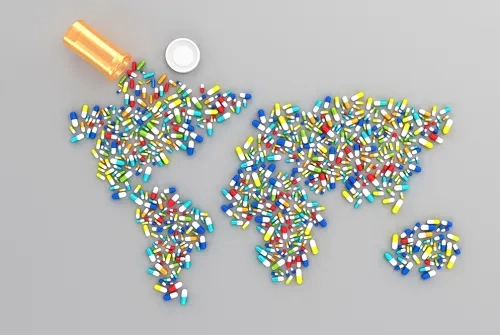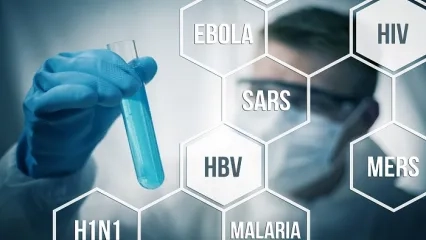Antibiotics Account For 14% of Prescription Costs
Although antibiotic use rates tend to decrease in our country, we are still one of the countries that consume antibiotics the most. Yeditepe University Koşuyolu Hospital Infectious Diseases and Clinical Microbiology Specialist Prof. Dr. Meral Sönmezoğlu stated that according to the data of the Organization for Economic Co-operation and Development (OECD), our country is the country that consumes the most antibiotics with the daily defined dose used per 1000 people. Prof. Dr. Sönmezoğlu pointed out that antibiotics accounted for 14 percent of prescription costs.
The introduction of antibiotics has been a revolutionary development in terms of infectious diseases and public health. While the most important cause of loss of life in the use of antibiotics is infections, today it has fallen to third place after cardiovascular diseases and cancer. After antibiotics were introduced, the frequency of some infectious diseases decreased, and the lives of millions of people were saved by antibiotic treatments. Over time, however, the intensive use of antibiotics reveals a very serious picture that the whole world is talking about today; antibiotic resistance.
Antibiotic Resistance Could Cost $1.4 Trillion By 2050
Drawing attention to the fact that approximately 700 thousand people die every year due to antimicrobial resistance, Yeditepe University Koşuyolu Hospital Infectious Diseases and Clinical Microbiology Specialist Prof. Dr. Meral Sönmezoğlu: “If the resistance rate continues to increase at this rate, it is estimated that 10 million people will lose their lives every year in 2050 due to antimicrobial resistance. Turkey is one of the countries with the highest levels of antibiotic consumption and antimicrobial resistance. Therefore, when global economic loss estimates are updated for our country, Turkey is thought to be at risk of economic loss of between $220 billion and $1.4 trillion by 2050 due to high antibiotic resistance.”
Antibiotics Account For 14% of Prescription Costs
Reminding that the intensive use of antibiotics not only in medicine but also in agriculture and livestock today contributes to the increase and spread of resistant bacteria, Prof. Dr. Meral Sönmezoğlu continued as follows:
When the prescriptions issued in 2011 in primary care were evaluated according to the "Prescription Information System (RBS)" data, it was determined that a total of 439,539,673 boxes of drugs were prescribed and 12.71 percent of them consisted of antibiotics. When the cost analyses of regulated prescriptions are made, it is seen that antibiotics constitute 14.14 percent of the overall cost. These figures show that antibiotics have a very important place in drug consumption in our country and rational antibiotics are not used. According to the data of the Organization for Economic Co-operation and Development (OECD), our country consumes the most antibiotics (38.1) with the daily defined dose (DDD/1000) used per 1000 people. Considering that the OECD average is 21,’ the picture of our country is much clearer.”
Studies May Reverse Output Acceleration
Although Turkey ranks first in terms of antibiotic consumption, it is seen that the measures taken in recent years have started to yield results. Stating that the prohibition of the use of over-the-counter antibiotics, which started to be applied in 2013, is an important step, Prof. Dr. Sönmezoğlu: “In 2011, the World Health Organization (WHO) decided on a global action plan and proposed a series of applications with the concern that there would be no effective antibiotics left for future generations. One of them was the prevention of the use of antibiotics without a prescription, which started to be applied in our country. The rate of antibiotic use, which was 21.14 percent in 2011, decreased every year and reduced to 15.81 in 2018.”
Antibiotics Are Used Unnecessarily In Half of Upper Respiratory Tract Infections
Stating that antibiotics are mostly used in upper respiratory tract infections, Yeditepe University Hospital Infectious Diseases and Clinical Microbiology Specialist Prof. Dr. Meral Sönmezoğlu continued as follows: “In fact, antibiotics are ineffective because such infections are not caused by bacteria but by viruses. Therefore, studies show that antibiotics are unnecessary in half of these infections. All groups such as physicians, pharmacists, nurses, other health personnel, patient/ patient relatives, producers, regulatory authorities, and media must work together and cooperate in order to solve this problem that concerns the whole society and to apply rational antibiotic use."
What to Do to Use Antibiotics Properly
• Antibiotics should only be taken when the doctor recommends and with a prescription.
• How long to use antibiotics should be according to the doctor's recommendation and should not be stopped when the fever decreases the pain.
• Antibiotics are not antipyretics or painkillers. High fever is not a reason to use antibiotics. Patients and their relatives should not try to direct the doctor according to their own experiences and should not be persistent.
• There may be a separate treatment for each patient. Therefore, patients with the same type of disease should not be prescribed antibiotics to others.
• The oral, intramuscular, or intravenous administration and type of antibiotic are decided by the doctor. However, patients who are not hospitalized should be given antibiotics as narrowly effective as possible and taken orally.
12 Key Interventions Proposed by WHO to Promote Rational Drug Use
1- Establishment of institutions that will coordinate drug use policies and monitor their effects,
2- Utilizing Clinical Diagnosis and Treatment Guidelines to support training, supervision, and decision-making processes,
3- Creating a list of basic drugs based on first-option treatments,
4- Establishment of drug and treatment boards in regions and hospitals,
5- Providing problem-based pharmacotherapy training in the curriculum before graduation,
6- Organizing continuous in-service medical training as a requirement
7- Development of monitoring, audit, and feedback systems within the institutional framework
8- Use of independent (impartial) information sources on medicines,
9- Educating the public about drugs,
10-Avoiding unethical financial initiatives,
11- Implementation of appropriate and mandatory regulations,
12- Ensuring sufficient government expenditures to ensure the availability of medicines and personnel.
Press Coverage: cumhuriyet.com | ntv.com | gazetevatan.com | aa.com | haberturk.com | odatv.com
About
Faculty and Year of Graduation:
Medical Faculty of Ankara University, 1984
”
See Also
- What Precautions Should Be Taken Against the Cold Epidemic?
- Don't Be Late Fighting Against Diseases
- Antibiotics Kill Beneficial Bacteria, Not Viruses
- What is Hepatitis? What are the Symptoms and Treatment Methods?
- Symptoms and Treatment of Tick Bites
- Summer Infections
- Precautions Must Be Taken Against Loss of Life Due To Infection in Thalassemia
- Information on H1N1 (Swine Flu)
- Summer is Coming... Beware of food poisoning!
- Our Taboos Affect the Increase in the Number of HIV-Positive Cases in Turkey
- Strep A Symptoms and Treatment
- Do Not Put a Cigarette Butt or Pour Olive Oil or Liquid Soap on the Tick
- Reheat the Food You Cooked Only Once!
- HIV Can Be Hidden for 10 Years without Any Symptoms!
- 290 Million People Live Without Knowing They Have Hepatitis
- Things to Consider When Touching Meat at Eid
- What Is Anthrax Disease?
- The Way to Fight AIDS is to Raise Awareness First
- Still Not Too Late For Flu Vaccine
- What is Rhinovirus?
- Fighting with Thalassemia: Meral Yılmaz
- Thalassemia Spreads from the Mediterranean to the Whole of Europe with Migration!
- Early Treatment of Crimean Congo Hemorrhagic Fever is Vital
- Approximately 3 Million Patients Need Blood Transfusions Every Year in Turkey
- When to Get the Flu Vaccine
- West Nile Virus Replaces Malaria
- It Is Necessary to Try to Be Healthy in order to Be Protected
- A New Flu Outbreak is Expected Every 10 Years
- 63% of Vector-Borne Diseases are Caused by Lyme Disease
- Experts Warn About Flu Risk
- Mosquito Infection Risk
- Why aren’t Antibiotics Working Any More?
- The World Raises an “Alarm” on Antibiotic Resistance!
- What is COVID-19?
- The Mask Requirement was Removed and the Importance of Social Distance Increased!
- How to Prevent COVID-19 in School-Going Children
- WHO (World Health Organization) Warns for Antibiotic Resistance!
- Who Is Threatened by Monkeypox?
- Ways to Prevent Coronavirus
- Swine Flu / H1N1
- Life Returns to Normal with Caution
- What is Monkeypox Virus? What Are the Symptoms of the Monkeypox Virus?
- What is Lyme Disease?
- How to Tell if You Have a Mild Coronavirus?
- Pay Attention to These Rules for COVID-19
- Hand Sanitizer Usage Guide
- The Priority Rule for the Protection from Summer Infections is Hygiene
Alo Yeditepe




